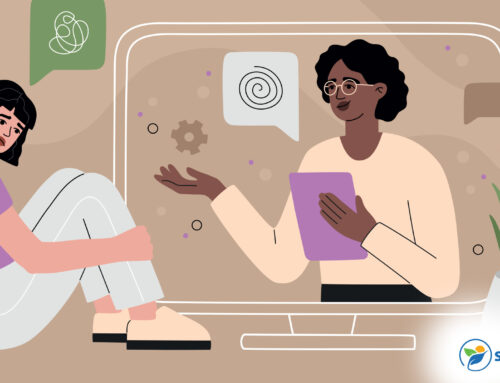In 2020 alone, more than 40 million American adults sought the help of a therapist for their mental health. There are many reasons you might want to talk with a therapist. For example, some people use talk therapy to deal with ongoing stressors with work or their current home life. Others use therapy to work out things they’ve already lived through that are still bothering them, such as a traumatic event or an unhappy childhood.
Regardless of the reason, you may find yourself thinking, “I don’t know what to talk about in therapy.” The feeling of not knowing what to talk about in therapy is a common worry, but it gets easier once you begin a dialogue. Below, we’ll discuss what to talk to a counselor about and provide additional valuable information on how to get the most out of your therapy sessions.
The Importance of Being Open With Your Therapist
Remember, your therapist can only help you if you’re entirely honest with them. There’s no reason to feel too ashamed or guilty to talk openly about things you’ve done or felt because a therapist is a mental health professional who won’t judge you. On the contrary, they can provide valuable techniques for reducing stress, managing certain mental health symptoms and overcoming past traumas. But they can only offer you the best help if you’re open with them during your sessions.
Conversation Opener Ideas to Get Dialogue Flowing
Knowing that you should be open with your therapist is one thing — and most people already have the desire to speak their truth during their sessions. But getting the dialogue flowing can be challenging, especially if you aren’t sure how to bring up certain topics you’d like to talk about. Thankfully, there are a few excellent ways to start a conversation smoothly during your first (or any) therapy session.
1. Contemplate Why You’re Drawing a Blank
If you can’t think of anything to say during your therapy session, consider why that is. Do you feel like your problems are unimportant and therefore unworthy of discussion? Are you seeking help for traumatic events that are challenging to talk about? Is being vulnerable naturally difficult for you, and you’re having problems opening up to a new person?
Once you figure out the reason, you can begin working on the solution. For example, you can tell yourself that your problems really are important and deserve to be discussed. You can even share this feeling of inadequacy or unimportance with your therapist and use that as a starting point for the conversation.
Or, tell your therapist that the traumatic events you’re seeking help for are hard for you to talk about. Be open and honest about any symptoms that appear when you discuss the events, and see if your therapist can provide techniques to help you work through those symptoms.
2. Write Things Down Before Your Appointment
You may be drawing a blank on what to talk about because you feel a lot of pressure in the moment. This is similar to stage fright, when an actor who normally knows their lines suddenly freezes up once they stand before an audience. Once again, feel free to share this feeling with your therapist if you find this is the case.
However, you can also work on this mental block on your own by writing things down before your appointment. As you remember something or encounter new situations that make you angry, stressed or sad, write them down in a notebook or on your phone’s note-taking app. Make a habit of writing these things down, even if they seem minor. If something elicits an emotional response, it’s not a small thing; rather, it’s very important to you.
When you have your list of things you wanted to talk about in front of you at your next therapy session, the pressure of coming up with something to talk about may disappear.
3. Dive Right Into the Big Issues
A common problem people encounter when starting therapy is the need for small talk. Most initial human interactions begin with trivial pleasantries before moving on to more significant topics. If this is how you’d like to approach your therapy sessions, that’s fine. You should proceed through your therapy in the way you feel most comfortable. However, small talk isn’t necessary.
If you don’t know what to talk about in therapy, maybe it’s because you don’t want to do the small talk thing. It’s okay to dive right into the big issues. Don’t feel like you have to get to know your therapist by asking about their day. Instead, go right ahead and immediately talk about your traumatic childhood or that annoying coworker who makes your workdays feel awful. Discuss previous domestic abuse relationships, deaths that have significantly impacted you or your nearly crippling health anxiety. Once you dive into the big issues, your therapist can help you by navigating deeper into topics where you’re comfortable.
Is In-Person or Text Therapy Better?
In today’s world, there are many text therapy apps you might have seen advertisements for or even tried. Unfortunately, many people find that they quickly begin running out of things to talk about in therapy of this type, and there’s a reason for that. Text therapy apps are naturally less proactive about the healing process, and they don’t dive nearly as deep as an in-person session. Because of this, text therapy apps may make it feel like you have to introduce more information on your own. An in-person therapist has different methods for stimulating conversation.
While text therapy may be an excellent in-between if you can’t physically get to a therapy office, it isn’t the best option for long-term use. Scheduling a physical session with a licensed therapist will likely provide better results than using a text-based mental health app.
Don’t Let Thoughts of “I Don’t Know What to Talk About in Therapy” Hold You Back — Get the Help You Need Today
If you’re looking to find a therapist that can help you with your struggles but haven’t found one yet, there’s still hope. Don’t be afraid to reach out and get the therapy you need by contacting us now. Our team of knowledgeable counselors is ready to take your call and set you up with a therapist who you can talk with to help improve your life.






